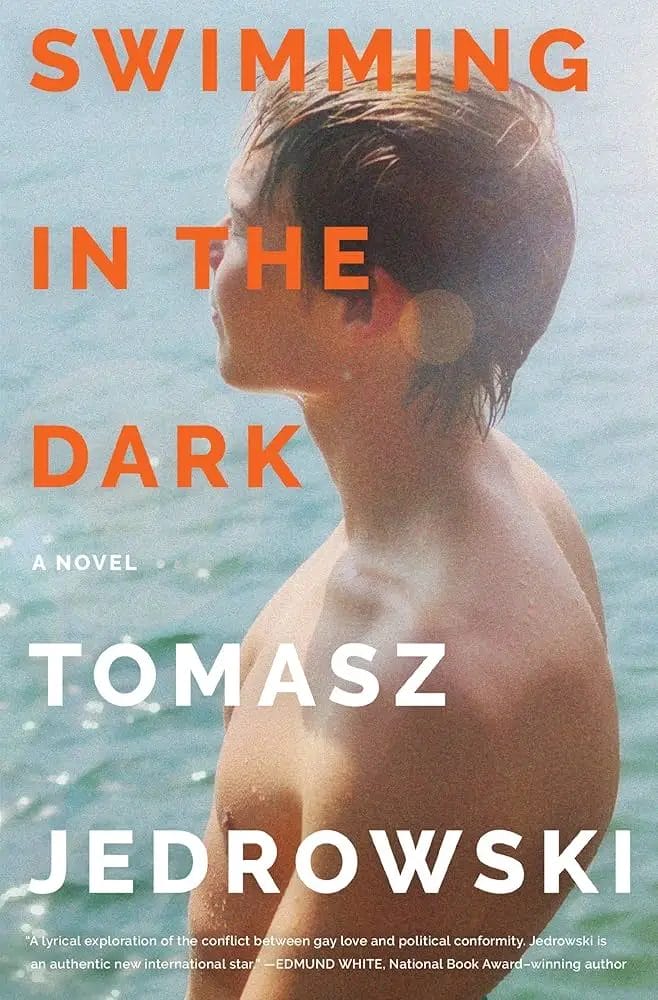

Swimming in the Dark
Set in early 1980s Poland against the violent decline of Communism, a tender and passionate story of first love between two young men who eventually find themselves on opposite sides of the political divide—a stunningly poetic and heartrending literary debut for fans of André Aciman, Garth Greenwell, and Alan Hollinghurst.
When university student Ludwik meets Janusz at a summer agricultural camp, he is fascinated yet wary of this handsome, carefree stranger. But a chance meeting by the river soon becomes an intense, exhilarating, and all-consuming affair. After their camp duties are fulfilled, the pair spend a dreamlike few weeks in the countryside, bonding over an illicit copy of James Baldwin’s Giovanni’s Room. Inhabiting a beautiful, natural world removed from society and its constraints, Ludwik and Janusz fall deeply in love. But in their repressive Communist and Catholic society, the passion they share is utterly unthinkable.
Once they return to Warsaw, the charismatic Janusz quickly rises in the political ranks of the party and is rewarded with a highly coveted government position. Ludwik is drawn toward impulsive acts of protest, unable to ignore rising food prices and the stark economic disparity around them. Their secret love and personal and political differences slowly begin to tear them apart as both men struggle to survive in a regime on the brink of collapse.
Shifting from the intoxication of first love to the quiet melancholy of growing up and growing apart, Swimming in the Dark is a potent blend of romance, postwar politics, intrigue, and history. Lyrical and sensual, immersive and intense, Tomasz Jedrowski’s indelible and thought-provoking literary debut explores freedom and love in all its incarnations.
My thoughts:
There’s something quietly devastating about this book. It’s a beautifully written, deeply affecting story of first love, identity, and impossible choices—all set against the tense backdrop of 1980s communist Poland. It’s intimate and political, but also tender and gutting.
The structure is unique in that it is told in the form of a long, reflective letter from Ludwik, who is now living in the United States, to Janusz, the man he loved when he was young. It starts as a reflection on their time together but by the end it feels more like a confession, or maybe a goodbye. As readers, we’re placed directly inside Ludwik’s memories and we experience the hope he had that maybe, someday, he and the man he loved could run away and be happy together. But now, Ludwik is in the US and Janusz is still in Poland. Ludwik doesn’t know if Janusz is even still alive.
When Ludwik meets Janusz at a mandatory agricultural camp, the attraction is immediate but cautious. What follows is a brief escape from their harsh realities into the countryside where the two fall in love over shared meals, lake swims, and a forbidden copy of James Baldwin’s “Giovanni’s Room” (another book I plan to read this month).
These scenes between the two men are filled tenderness and hope. You want to believe that they might find happiness. But the return to Warsaw brings reality crashing back. Janusz chooses ambition. He’d rather be important than in love, and firmly believes that he and Ludwik can be together, but just in secret. He refuses to believe that things could really ever “get that bad”. On the other hand, Ludwik chooses truth. He refuses to bow down and give up on freedom. And from there, they begin to drift apart, pulled in opposite directions by both ideology and survival instinct.
Jedrowski’s writing feels personal and I honestly felt as though I was reading an actual letter to a lost love. The emotional depth here is real. It lingers and it hurts. What hit me hardest was how much Ludwik’s experience somewhat resonated with my own experience growing up queer in a conservative town in Idaho during the ‘80s and ‘90s. I didn’t live through war or political collapse, but I understood the feeling of always having to hide, always calculating how much of myself was safe to reveal. (None. It was none. At least not until I moved and started college and felt safe enough to be myself.) I understood Ludwik’s quiet dread. His exhaustion of always hiding and his longing for escape.
I’ve seen this book compared to “Call Me By Your Name” and while I understand the comparison (both center on young men navigating their queerness in unaccepting societies) this book carries a different kind of weight. The stakes are higher. There’s no Italian villa or parental tenderness here. There’s communism. Fear. Censorship. The knowledge that even a whisper of truth could ruin lives. (To those in the U.S. right now—sound familiar?)
This is a must-read for anyone interested in queer history, or simply beautiful storytelling. But be warned. It’s not a traditional love story. It’s not wrapped up in sunshine and rainbows at the end. There’s no Hollywood happy ending. It’s sad and it’s not one that leaves you feeling good once you’ve finished it. But for those who’ve ever lived in the margins it will hit home.
Genre(s):
Other Bookish Tags:













